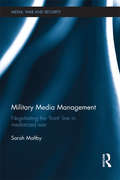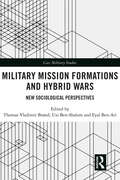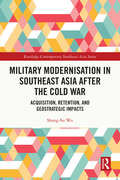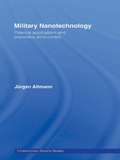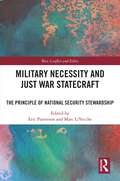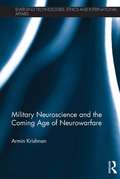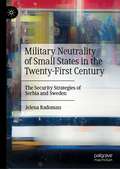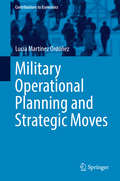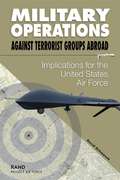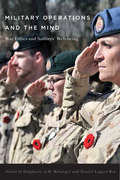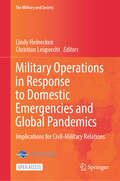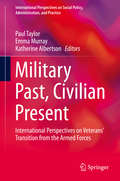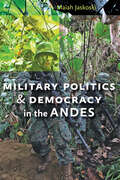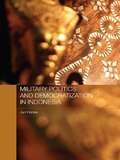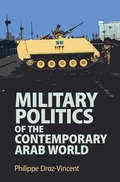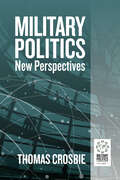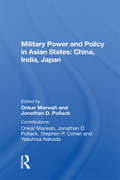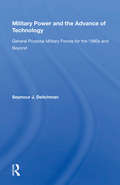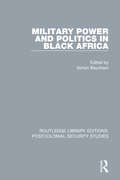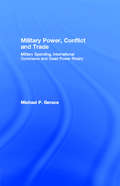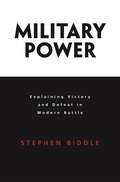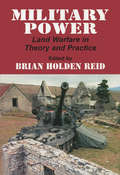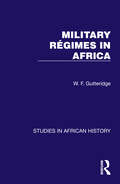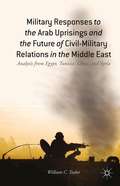- Table View
- List View
Military Media Management: Negotiating the 'Front' Line in Mediatized War (Media, War and Security)
by Sarah MaltbyThis book examines the practices of actors involved in the media reportage of war, and the ways in which these practices may influence the conduct of modern military operations. War is a complex phenomenon which raises numerous questions about the organization of society that continue to challenge all those involved in its study. Increasingly, this includes the need to engage theoretically and empirically with the progressive collapse between the ways in which wars are conducted and the manner in which they are reported in the media. Drawing on the work of Erving Goffman, Military Media Management offers a distinctly new approach to our appreciation of the dynamic relationship between war and media; one that is fundamentally a product of social relations between those engaged in reporting war, and those conducting war campaigns. By exploring how and why the military manage information in particular ways, the text succeeds in providing a framework through which wider sociological investigation of this relationship can be understood. This book will be of much interest to students of military and security studies, media studies, war and conflict studies and IR in general.
Military Mission Formations and Hybrid Wars: New Sociological Perspectives (Cass Military Studies)
by Thomas Vladimir Brønd, Uzi Ben-Shalom and Eyal Ben-AriThis volume explores and develops new social-scientific tools for the analysis and understanding of contemporary military missions in theatre. Despite the advent of new types of armed conflict, the social-scientific study of militaries in action continues to focus on tools developed in the hey-day of conventional wars. These tools focus on such classic issues as cohesion and leadership, communication and unit dynamics, or discipline and motivation. While these issues continue to be important, most studies focus on organic units (up to and including brigades). By contrast, this volume suggests the utility of concepts related to mission formations – as opposed to ‘units’ or ‘components’ – to better capture the (ongoing) processual nature of the amalgamations and combinations that military involvement in conflicts necessitates. The study of these formations by the social sciences – sociology, social psychology, anthropology, political science and organization science – requires the introduction of new analytical tools to the study of militaries in theatre. As such, this volume utilizes new approaches to social life, organizational dynamics and to armed violence to understand the place of the armed forces in contemporary conflicts and the new tasks they are assigned. This book will be of much interest to students of military studies, sociology, security studies and International Relations in general.
Military Modernisation in Southeast Asia after the Cold War: Acquisition, Retention, and Geostrategic Impacts (Routledge Contemporary Southeast Asia Series)
by Shang-Su WuSoutheast Asian countries represent a wide range of approaches to military modernisation due to their great diversity in politics, economies, geography and other factors. Bounded by the Pacific and Indian Oceans and located between China and India is the setting for the geostrategic impacts of military modernisation in Southeast Asian countries.Differing from previous research focused on military acquisition, this book additionally covers retention of assets and carefully examines the ageing issues that affect readiness and capabilities. In doing so, it provides a comprehensive view of military modernisation. This book also compares each country’s situation in the region in terms of military strength and security challenges to elaborate on the geostrategic impacts of military modernisation. The ten cases of military modernisation in the post-Cold War context provide rich content for readers to explore the evolution of military modernisation in developing countries after 1991.This book sheds light on security studies of Southeast Asia and is a useful resource for academic researchers, policy-makers and defence practitioners.
Military Nanotechnology: Potential Applications and Preventive Arms Control (Contemporary Security Studies)
by Jürgen AltmannWith revolutionary changes in nanotechnology (NT) now on the horizon, many countries have started major research and development (R&D) programmes, which are mainly civilian. Often overlooked are military R&D programmes – in particular those of the US government. This is the first systematic and comprehensive presentation of the potential military applications of NT. In ten to twenty years, these applications may include extremely small computers, robots, missiles, satellites, launchers and sensors. They may also provide lighter and stronger materials for vehicles and weapons, implants in soldiers’ bodies, metal-free firearms, autonomous fighting systems, and smaller chemical and biological weapons. These potential uses raise strong concerns. This assessment is made from a viewpoint of international security, considering the new criteria of dangers for arms control and the international law of warfare, dangers for stability through potential new arms races and proliferation, and dangers for humans and society. Some military applications, such as computers, will be so close to civilian uses that limits are impractical. Others, such as sensors for biological-warfare agents, may contribute to stronger protection against terrorist attacks and better verification of compliance with arms-control treaties. For preventive limitation of these new technologies, specific approaches are proposed that balance positive civilian uses and take into account verification of compliance, with a view to international peace and security, not national military strength. This book will be of great interest to scholars of military technology, non-lethal weapons, disarmament and security studies in general.
Military Necessity and Just War Statecraft: The Principle of National Security Stewardship (War, Conflict and Ethics)
by Eric PattersonThis book analyses the concept of military necessity and just war thinking, and argues that it should be seen as a vital moral principle for leaders. The principle of military necessity is well-understood in the manuals of modern militaries and is recognized in the war convention. It is the idea that battlefield commanders should make every effort to win on a local battlefield, within legal means, and using proportionate and discriminating weapons and tactics. Every legal textbook on war includes military necessity as a foundational principle within the jus in bello (ethics of fighting war) alongside principles of proportionality and distinction, and it is taught in every Western military academy. Even the International Committee of the Red Cross lauds the concept as a cardinal principle of warfare. However, unlike legal scholarship, pick up a book by almost any just war thinker in philosophy, theology, or the social sciences, and the concept is missing altogether. This volume returns military necessity to just war thinking and lays out the argument for doing so. Each contributor taps into one of the many dimensions of military necessity, such as its relationship to jus ad bellum (ethics of going to war) categories (e.g. right intention), its relationship to jus in bello categories, or its application in foreign policy and military doctrine. Case studies in the book point out the practical moral dimensions of military necessity in cases from the targeted killing of terrorists to battlefield decisions that led to the use of the atomic bomb at Hiroshima. This book will be of interest to students of just war theory, military ethics, statecraft and International Relations.
Military Neuroscience and the Coming Age of Neurowarfare (Emerging Technologies, Ethics and International Affairs)
by Armin KrishnanKrishnan describes military applications of neuroscience research and emerging neurotechnology with relevance to the conduct of armed conflict and law enforcement. This work builds upon literature by scholars such as Moreno and Giordano and fills an existing gap, not only in terms of reviewing available and future neurotechnologies and relevant applications, but by discussing how the military pursuit of these technologies fits into the overall strategic context. The first to sketch future neurowarfare by looking at its potentials as well as its inherent limitations, this book’s main theme is how military neuroscience will enhance and possibly transform both classical psychological operations and cyber warfare. Its core argument is that nonlethal strategies and tactics could become central to warfare in the first half of the twenty-first century. This creates both humanitarian opportunities in making war less bloody and burdensome as well as some unprecedented threats and dangers in terms of preserving freedom of thought and will in a coming age where minds can be manipulated with great precision.
Military Neutrality of Small States in the Twenty-First Century: The Security Strategies of Serbia and Sweden
by Jelena RadomanThis book explores the factors that account for military neutrality as a security strategy for small states. Through comparing the cases of Serbia and Sweden, who have both come to define their security policies in identicial terms of military neutrality/non-alignment, the book introduces a novel conceptual framework that is built against existing knowledge found in the small states and military neutrality literature. Drawing on different theoretical frameworks, the model explains why certain small states choose to stay outside of military alliances in the twenty-first century. The author then applies the new model to the two selected case studies.
Military Operational Planning and Strategic Moves
by Lucía Martínez OrdóñezThis book employs game theory to warfare and in particular to military operations. It aims at scrutinizing the validity of the two ideas that have governed the literature on war and warfighting: One is the Clausewitzian Fog of War, which suggests that he who is able to "see" through the gunsmoke and observe his opponent’s moves before he has to commit to some strategy himself, should be able to gain an advantage over that enemy; the other is the tradition of understanding military conflict as a zero-sum game. Combined, these ideas seem to imply that war always gives rise to a second-mover advantage. This book questions the validity of this presumption at the operational level of military planning. It provides a simple but rigorous game-theoretic framework in order to analyse operational alternatives for a whole range of typical conflicts Western military forces are facing, including the most recent ones such as Anti-Access/Area-Denial and supporting host nations' counterinsurgency campaigns.
Military Operations Against Terrorist Groups Abroad
by David OchmanekAlthough military power is only one component of the portfolio of instruments that can be brought to bear in the fight against terrorist groups, military capabilities play unique and crucial roles in the overall strategy. These capabilities will call for a mix of forces somewhat different from those fielded today as well as new concepts and technologies. Equally challenging will be the tasks of training/advising friendly forces and protecting forces and interests around the world.
Military Operations and the Mind: War Ethics and Soldiers' Well-being
by Daniel Lagacé-Roy Stéphanie A.H. BélangerOffering a Canadian perspective on the emotional health of servicemen and women, Military Operations and the Mind brings together researchers and practitioners from across the country to consider the impact that ethical issues have on the well-being of those who serve. Stemming from an initiative to enhance the lives of serving members by providing them with the best education and training in military ethics before and after deployments, this volume will better inform politics and public policies and enhance the welfare of the soldiers, sailors, and airmen and women who serve in singular, often harsh, and sometimes dangerous conditions. By integrating into the analysis the critical issue of well-being, this emerging field demonstrates a more holistic approach and is distinct from other fields in military, historical, philosophical, and behavioural studies. The first study of its kind, Military Operations and the Mind presents a new and helpful way to focus on the life of soldiers not only in operations overseas, but also once they return home. Contributors include Peter Bradley (Royal Military College of Canada), Victor M. Catano (Saint Mary's University), Danielle Charbonneau (Royal Military College of Canada), Howard Coomb (Royal Military College of Canada), Karen D. Davis (Defence Research and Development Canada), Colonel Richard Dickson (Canadian Army Land Warfare Centre), Joe Doty (Duke University), Allan English (Queen's University), Peter Gizewski (Department of National Defence), Heather Hrychuk (Centre for Operational Research and Analysis), E Kevin Kjelloway (Saint Mary's University), Allister MacIntyre (Royal Military College of Canada), Deanna Messervey (Queen's University), Damian O'Keefe (Saint Mary's University), Brigadier General (Ret'ed) G. E. Sharpe, Shaun Tymchuk (retired Canadian infantry officer), SLt Ethan Whitehead (Royal Canadian Navy), and Daphne Xu (National Institute of Education, Singapore).
Military Operations and the Mind: War Ethics and Soldiers' Well-being
by Daniel Lagacé-Roy Stéphanie A.H. BélangerOffering a Canadian perspective on the emotional health of servicemen and women, Military Operations and the Mind brings together researchers and practitioners from across the country to consider the impact that ethical issues have on the well-being of those who serve. Stemming from an initiative to enhance the lives of serving members by providing them with the best education and training in military ethics before and after deployments, this volume will better inform politics and public policies and enhance the welfare of the soldiers, sailors, and airmen and women who serve in singular, often harsh, and sometimes dangerous conditions. By integrating into the analysis the critical issue of well-being, this emerging field demonstrates a more holistic approach and is distinct from other fields in military, historical, philosophical, and behavioural studies. The first study of its kind, Military Operations and the Mind presents a new and helpful way to focus on the life of soldiers not only in operations overseas, but also once they return home. Contributors include Peter Bradley (Royal Military College of Canada), Victor M. Catano (Saint Mary’s University), Danielle Charbonneau (Royal Military College of Canada), Howard Coomb (Royal Military College of Canada), Karen D. Davis (Defence Research and Development Canada), Colonel Richard Dickson (Canadian Army Land Warfare Centre), Joe Doty (Duke University), Allan English (Queen's University), Peter Gizewski (Department of National Defence), Heather Hrychuk (Centre for Operational Research and Analysis), E Kevin Kjelloway (Saint Mary’s University), Allister MacIntyre (Royal Military College of Canada), Deanna Messervey (Queen’s University), Damian O'Keefe (Saint Mary’s University), Brigadier General (Ret’ed) G. E. Sharpe, Shaun Tymchuk (retired Canadian infantry officer), SLt Ethan Whitehead (Royal Canadian Navy), and Daphne Xu (National Institute of Education, Singapore).
Military Operations in Response to Domestic Emergencies and Global Pandemics: Implications for Civil-Military Relations (The Military and Society)
by Christian Leuprecht Lindy HeineckenThis open access book provides a comparative analysis of the deployment of the military in domestic operations, the use of the armed forces during the COVID-19 pandemic, and the impact of that deployment on civil-military relations in 26 countries worldwide. The book examines the legal and constitutional regulations under which the military can serve in domestic roles, and the extent of domestic deployment before the COVID-19 pandemic. It focuses on the roles in which the military served during the pandemic, the resources available, and the readiness and effectiveness of the military response. The volume addresses whether or not the pandemic response was securitized, the extent of civilian oversight and control, the accountability measures in place, and the impact of the COVID-19 deployment on the military&’s image. The volume captures the lessons learnt from the COVID-19 deployment and the implications for future force design, structure, and organizational transformation. Since almost all countries used their military in some capacity to respond to the COVID-19 pandemic, this volume offers an opportunity to compare use of the armed forces to provide domestic humanitarian assistance and disaster response.
Military Past, Civilian Present: International Perspectives on Veterans' Transition from the Armed Forces (International Perspectives on Social Policy, Administration, and Practice)
by Paul Taylor Emma Murray Katherine AlbertsonThis edited book presents a synthesis of current international knowledge on the topic of military veteran transition to civilian life. Understanding the transition of individuals from military institutions to civilian life is of great importance. The essential elements of transition support are currently widely debated in order to assess current practice and potential shortcomings in the intention to improve health, welfare and social outcomes for military veterans. This text links original research and critical commentary to public policy and practice in the area of veteran transition. Doing so through a collection of international perspectives assists in locating continuity and difference between strategies, agendas and the realities of what is actually known of the veteran’s experience. Chapters in this text examine the subject of transition along lines of enquiry that focus in on themes such as social justice, veteran identity and developments in transition agendas. Globally, many veterans face complex social issues such as low income, barriers to employment, and problems of health and welfare. Chapters take stock of the real-world issues affecting veterans and at the same time casts a critical eye over the limitations in accessing, or denial of access to opportunities, support and remedy. The veteran identity is an important dimension of enquiry here. This book looks at the relational factors between the veteran and the public, the creation of a master status and the challenges faced by veterans in transitioning into a cultural context that is saturated with imagery of what a veteran ‘is’. Chapters also seek to pose recommendations as to how the policy and practice agenda that surrounds veterans and the bridging of the gap between military and civilian life may be developed. Here authors point towards the value of knowledge, research and analysis that is underpinned by participatory strategies with veterans themselves. For example, seeking to establish lines of enquiry that value the voice of veterans as an ongoing and iterative dimension of developing understanding.
Military Politics and Democracy in the Andes
by Maiah JaskoskiInterviews with active-duty and retired military officers in Ecuador and Peru shed light on the evolution of Andean civil-military relations, with implications for democratization.Military Politics and Democracy in the Andes challenges conventional theories regarding military behavior in post-transition democracies. Through a deeply researched comparative analysis of the Ecuadorian and Peruvian armies, Maiah Jaskoski argues that militaries are concerned more with the predictability of their missions than with sovereignty objectives set by democratically elected leaders. Jaskoski gathers data from interviews with public officials, private sector representatives, journalists, and more than 160 Peruvian and Ecuadorian officers from all branches of the military. The results are surprising. Ecuador’s army, for example, fearing the uncertainty of border defense against insurgent encroachment in the north, neglected this duty, thereby sacrificing the state’s security goals, acting against government orders, and challenging democratic consolidation. Instead of defending the border, the army has opted to carry out policing functions within Ecuador, such as combating the drug trade. Additionally, by ignoring its duty to defend sovereignty, the army is available to contract out its policing services to paying, private companies that, relative to the public, benefit disproportionately from army security. Jaskoski also looks briefly at this theory's implications for military responsiveness to government orders in democratic Bolivia, Colombia, and Venezuela, and in newly formed democracies more broadly.
Military Politics and Democratization in Indonesia (Rethinking Southeast Asia)
by Jun HonnaThe military have had a key role to play in Indonesia's recent history and may well have a decisive role to play in her future. This book looks at the role of the military in the downfall of Suharto and their ongoing influence on the succeeding governments of B.J. Habibie and Abdurrahman Wahid. The author also examines such key features as human rights, reconciliation, civic-military discourse and ongoing security dilemmas. The book is unique in providing the best overview of the role of the military in the world's fourth most populous nation.
Military Politics of the Contemporary Arab World
by Philippe Droz-VincentAside from large-scale civic mobilisations, no force was more critical to the outcomes of the 2011 Arab uprisings than the armed forces. Nearly a decade after these events, we see militaries across the region in power, once again performing critical roles in state politics. Taking as a point of reference five case studies where uprisings took place in 2011, Tunisia, Egypt, Libya, Yemen and Syria, Philippe Droz-Vincent explores how these armies were able to install themselves for decades under enduring authoritarian regimes, how armies reacted to the 2011 Uprisings, and what role they played in the post-Uprising regime re-formations or collapses. Devoting a chapter to monarchical armies with a special focus on Saudi Arabia and the UAE, Droz-Vincent addresses whether monarchies radically differ from republics, to compare the foundational role of Arab armies in state building, in the Arab world and beyond.
Military Politics: New Perspectives (Military Politics #1)
by Thomas CrosbieBringing together new research by leading scholars, this volume rethinks the role played by militaries in politics. It introduces new theories of military politics, arguing against the inherited theories and practices of civil-military relations, and presents rich new data on senior officership and on the intersection of military politics and military operations. As the first volume in Berghahn Books’ Military Politics series, it provides a blueprint for a new research paradigm dedicated to tracing how militaries shape their political environments, focusing particularly on the core democratic questions raised by politically-effective (and ineffective) militaries.
Military Power And Policy In Asian States: China, India, Japan (Westview Special Studies On South And Southeast Asia)
by Onkar MarwahThis study challenges the belief that the security concerns and strategic objectives of lesser states are dependent on the dominant power alliances and on assessments by major powers of the prospects for peace or war. Focusing on the views of security and military power adopted by elites in China, India, and Japan, the contributors point out that e
Military Power And The Advance Of Technology: General Purpose Military Forces For The 1980s And Beyond
by Seymour J. DeitchmanThis book deals with the basic facts of the military-industrial complex, examining its institutional dynamics and constitutional barriers to change. It shows how simplistic journalistic prescriptions and trivial observations fail to do justice to the enormous complexity of an industrial economy.
Military Power and Politics in Black Africa
by Simon BaynhamFirst published in 1986, Military Power and Politics in Black Africa explores many themes that concerned military power and politics in sub-Saharan Africa at the time of publication. Adopting a thematic approach, the book considers the nature of both intervention and disengagement and looks at the relationship between civilian and military institutions. The final chapters put forward arguments for the importance of foreign intervention in the politics and civil-military relations of African states.
Military Power, Conflict and Trade: Military Spending, International Commerce and Great Power Rivalry
by Michael P. GeraceWherever international commerce flows in world politics, military power often flows with it - sometimes as a protector of commerce, sometimes as its promoters and sometimes as a tool of aggression against it. How are military power and international trade related? Do military power and commerce expand together or does military power decline as commerce (and perhaps interdependence) increases? Does this relationship vary across countries and, if so how? Power, Conflict and Trade is a study of the relationship between military power and international commerce among the Great Powers prior to World War I.After building an argument for a direct relationship between military power and commerce - one grounded in a mercantilist view of state power- and exploring their numerous connections, the book estimates models of the relationship among the Great Powers and explores a great deal of their commercial and military data, all of which is situated in the context of their mutual rivalries. Another question investigated is whether the peacetime conflicts and rivalries of the Great Powers affected their trade relations adversely. There is strong support for the argument that military power and commerce move together in world politics, though there is evidence for an inverse relationship as well.
Military Power: Explaining Victory and Defeat in Modern Battle
by Stephen BiddleIn war, do mass and materiel matter most? Will states with the largest, best equipped, information-technology-rich militaries invariably win? The prevailing answer today among both scholars and policymakers is yes. But this is to overlook force employment, or the doctrine and tactics by which materiel is actually used. In a landmark reconception of battle and war, this book provides a systematic account of how force employment interacts with materiel to produce real combat outcomes. Stephen Biddle argues that force employment is central to modern war, becoming increasingly important since 1900 as the key to surviving ever more lethal weaponry. Technological change produces opposite effects depending on how forces are employed; to focus only on materiel is thus to risk major error--with serious consequences for both policy and scholarship. In clear, fluent prose, Biddle provides a systematic account of force employment's role and shows how this account holds up under rigorous, multimethod testing. The results challenge a wide variety of standard views, from current expectations for a revolution in military affairs to mainstream scholarship in international relations and orthodox interpretations of modern military history. Military Power will have a resounding impact on both scholarship in the field and on policy debates over the future of warfare, the size of the military, and the makeup of the defense budget.
Military Power: Land Warfare in Theory and Practice
by Brian Holden ReidThe contributors here consider the multifarious aspects of the Anglo-American approach to war. All the contributors are concerned to base their work on the overall historical context. They explore the relationship between theory and practice in military operations.
Military Regimes in Africa
by W. F. GutteridgeOriginally published in 1975, this book examines the achievements of, and problems encountered by, African military regimes in office. It begins with 2 chapters discussing trends in the formation and organization of African armies and the influence on these armies of the colonial legacy. The author then studies 6 case histories in detail. His findings show that, though there are certain typical commonalities, each regime has its own particular characteristics. This will be of interest to students of African, military and colonial studies.
Military Responses to the Arab Uprisings and the Future of Civil-Military Relations in the Middle East
by William C. TaylorThis book explains Arab military responses to the social uprisings which began in 2011. Through a comparative case study analysis of Egyptian, Tunisian, Libyan, and Syrian militaries, it explains why militaries fractured, supported the regime in power, or removed their presidents.
